Text
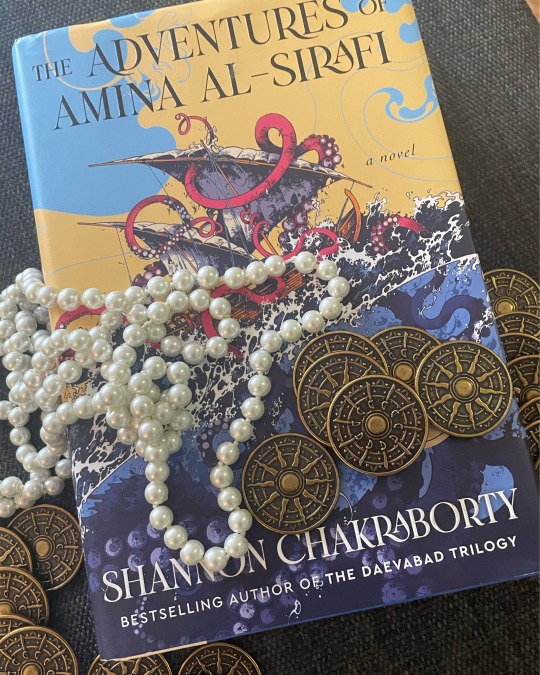
⭐️⭐️⭐️⭐️⭐️I always love when books perfectly execute on their half of the implicit bargain they strike with the reader. If you don’t like Amina Al-Sirafi, that’s a matter of taste and opinion, but you cannot say this book does not wear its heart on its sleeve. It promises you badass lady pirates having magical swashbuckling adventures, and it delivers badass lady pirates having magical swashbuckling adventures.
The cast is this books strongest point—they feel like real people, with real problems, and they have distinct voices, and flaws, and strengths. I don’t always agree with the decisions they make, but each one feels true to the character in question.
I also loved the world! It felt rich, and full, and I could smell the sweat and spices, feel the silks and splinters. I want someone to spend stupid amounts of money to give this the adaptation it deserves. One of my favorite reads of the year and a rip roaring good time.
Recommended for fans of P. Deji Clark, and Our Flag Means Death.
#bookstagram#bookreview#bookrecommendations#books#justfinishedreading#historical fantasy#swashbuckling
0 notes
Text
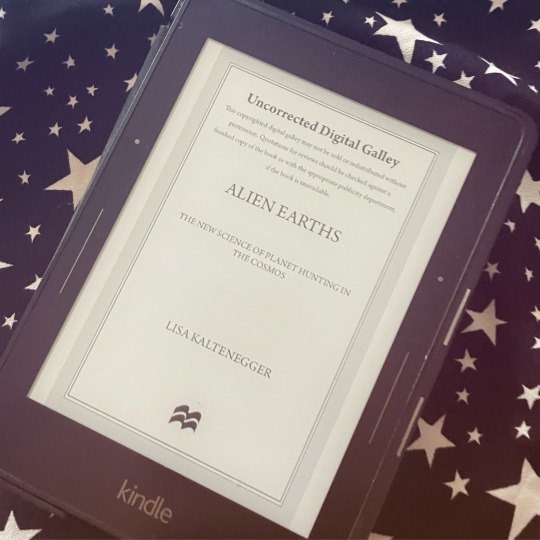
⭐️⭐️⭐️ I think I would have liked Alien Earths a lot better if I hadn’t read three other books about exoplanets. It’s not the author’s fault that she’s writing for a general audience and I’m getting bored because I already know how this goes. However, the unfortunate thing is, if a member of that general audience asked me for a fun book about exoplanets I’m not sure this one would make the list. The author is Austrian, and I presume, therefore, her primary language is German, and while the writing is not bad (and for sure, far far far better than anything I would write in any other language), it is at times stilted and not as smooth as I’d like. Ultimately, I think this book is just fine, but there are better books out there on exoplanets.
Where this book truly shines is in the tantalizing and fleeting descriptions of the author’s own laboratory work. I want more details about how they use lasers and microscope parts to generate spectrographs of lava planets. I want to know how she grows a rainbow of mold in petri dishes to get color fingerprints of different kinds of life. I think the time would have been far better spent giving more detail there instead of going over the same broad outlines of the hunt for exoplanets that I’ve read before.
I received an advance reader copy in exchange for this honest review.
0 notes
Text
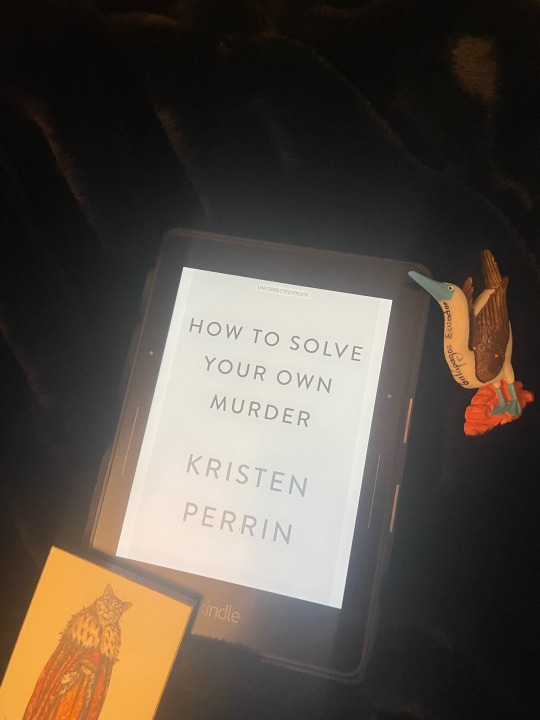
⭐️⭐️⭐️ Who is ready to play debut novel bingo? Because this mystery pitched itself as for fans of Knives out and Thursday Murder Club. I'll say I found it more like the latter than the former. (I was disappointed by Thursday Murder Club.) I do think I liked it better than I liked Thursday Murder club, which I thought played fast and loose with the author/reader mystery novel contract. How to Solve Your Own Murder, by contrast, was simply uneven.
How to Solve Your Own Murder may have also suffered from setting my expectations too high for its own good. It opens very strongly, with a 17 year old Frances getting her fortune told at a fair. Rather than the usual pablum, she gets a warning, "Your future contains dry bones..." Frances spends the rest of her life trying to avoid being murdered, until finally her fortune catches up with her. Her grandneice Annie has to solve the case before she's next.
Its a great conceit, and the mystery itself is scrupulously fair--attentive readers will have all they need to figure out whodunnit and go toe to toe with the real detectives. However, this book suffers from some sloppiness that prevents it from being an unqualified recommendation. There's a part of this book that wants to be a Secret Staircase murder mystery (this is my favorite part), a part that wants to be a cozy mystery, and a part that wants to go more "gritty." These parts cause some careening back and forth and makes the novel feel less polished.
There is also some convenient holding of the idiot ball. One of the conceits of the novel is that Annie has found Frances's old diary, and she is reading it. As she reads it, the parts she's reading are interspersed in the book. Unfortunately, the narrative has to resort to some obvious contortions to ensure that Annie doesn't get too far ahead of herself in solving the mystery. The final bump for me is that the book involves two different [spoiler redacted] subplots, which in a very small town seems to me a bit much.
Over all this is a sloppy but promising debut mystery that I wish had gotten a little more polish.
1 note
·
View note
Text
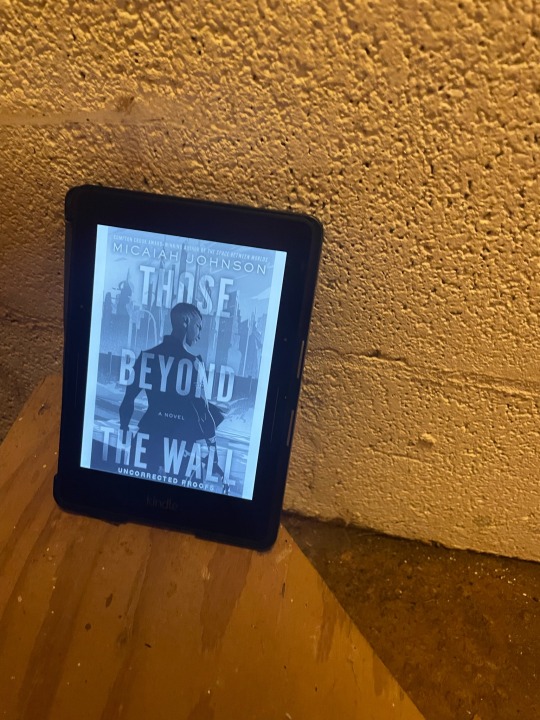
⭐️⭐️⭐️⭐️⭐️ I loved The Space Between Worlds when I read it many years ago. I recommended it widely and sang its praises, so I was very excited when the publisher offered me an advance copy of the long awaited sequel, Those Beyond the Wall. If what I say here sounds interesting to you though, read The Space Between Worlds, (and actually, if it’s been a minute since you read The Space Between Worlds, I’d recommend going in for a reread before diving in here) as this is a true sequel that will assume you’ve read the first, and have a lot less to offer you if you haven’t read it.
I love Johnson’s word building, which continues to feel real, true, and fresh, even in the sequel. Sometimes second books lack some of the wonder and propulsive curiosity that drives the first as the world has already been fully explored. Not this sequel. I could feel the dirt and the dust, see the sparkling skylines, and smell the blood. As a warning: this book does have a decent amount of blood, guts, and body horror, but it never feels gratuitous or unearned.
The thing that I think this book does the best is complexity. The characters are complicated--they have trauma, they have desires, and sometimes they want one thing one moment and another the next. They feel like real, complicated, messy people. There is nothing as simple as a one way redemption arc here--they take hesitant steps towards improvement and then they backslide. It’s also not a book that’s going to make you feel comforted or satisfied at the end of it. You’re going to be asking questions. You’ll probably not know exactly how you feel about it. If you like N.K. Jemison, The Expanse, or A Memory Called Empire, I’d give this one a shot.
This book is also unapologetically genre, and genre at its best. It doesn’t hedge by saying it’s “elevated genre” or “literary genre” or “lit fic with a genre twist.” This book is clearly written by an author who loves genre, for people who love genre. Johnson is a rising star and I can’t wait to see where she goes next.
The publisher gave me an advance copy on NetGalley in exchange for this honest review.
0 notes
Text
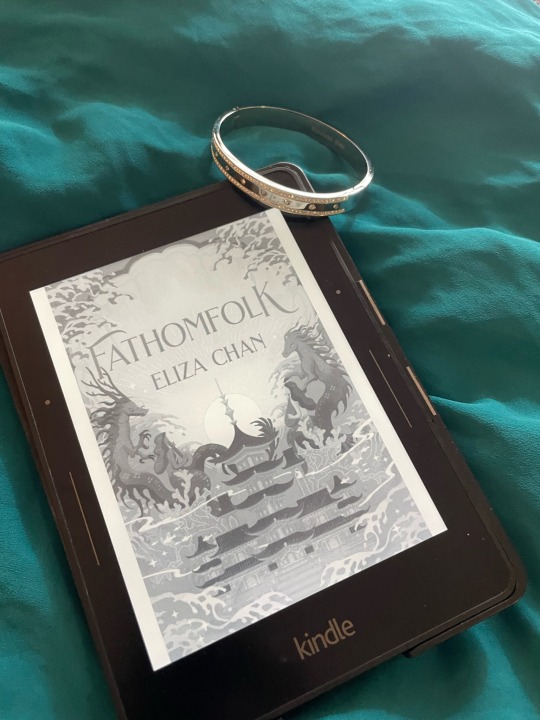
⭐️⭐️⭐️🌗There’s a lot to like about this debut novel. The story of radicalization it tells is heartbreaking and believable. I really enjoyed the world building, and some of the characters really shine. However, the prose could have used a bit more polish, and it still has some rough debut edges that made the reading experience less than ideal. Fathomfolk is an Asian inspired climate allegory Little Mermaid retelling. If that sounds like a lot, you’d be right. The author has set herself a high degree of difficulty and mostly succeeded.
In a world where climate based flooding has reduced humans to living on stilts and in highrises on flooded cities, and pollution is pushing part-human-part-sea creatures called fathomfolk into smaller and smaller habitable areas of the sea, a clash of cultures is inevitable. In the largest of these cities, Tiankawi, Mara is a mixed race siren, who is dating the Fathomfolk ambassador, a dragon named Kai. As tensions rise in the city--inflamed by the terrorist group the Drawbacks--she fights for the rights of the Fathomfolk immigrants and the safety of all people. Nami, Kai’s niece, has been sent on a mission, and she will be drawn into the political tides. Meanwhile a sea witch has her own plots to juggle. Finally, we see the ambitious human minister of defense, who is willing to step over whoever he needs to to gain more political power.
At 448 pages, this book is a little messy. In particular, at about 80% of the way through the book there’s a point that feels like a very satisfying ending, and then the book tries to fit one more twist, but it feels oddly paced and rushed. In a debut like this I think it might have been a better strategy for the author to write a 350 page book with a slightly lower degree of difficulty and make it cleaner, and tighter, rather than this book which has some very good elements but ultimately sags a little under some of the weight.
I recommend this book for people who like Fonda Lee, Wesley Chu, and aren’t bothered by a little debut clunkiness.
I received an ARC from the publisher in exchange for this honest review.
0 notes
Text
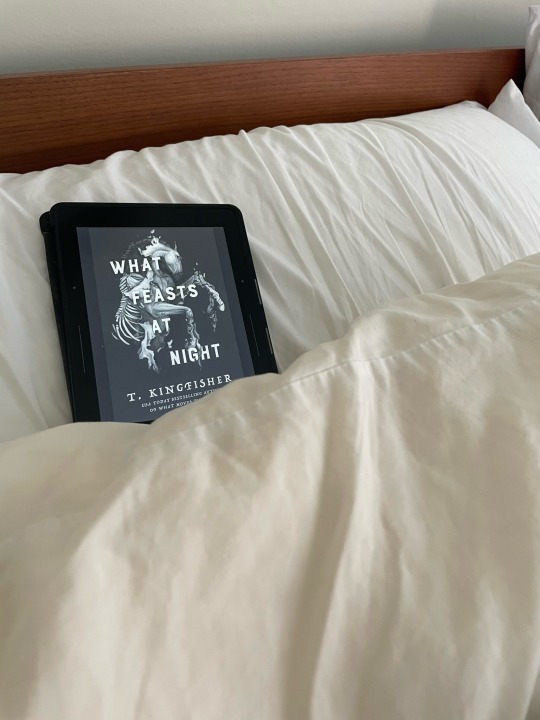
⭐️⭐️⭐️⭐️ I was a big fan of the first Sworn Soldier novella, so I was delighted to hear that tor nightfire would be doing a second. If anything I think this is the stronger of the two—I think not being beholden to any particular plot only made the story feel more immersive. And the two are separated enough that you can read them in any order. I love the characters. They have no right to be as fully human as they are given that the novella is under 200 pages. If you were worried about What Moves the Dead because of the body horror, this one is still spooky, but less scary and much much less body horror. (Still a little bit though!) I love how even amid the horror and the bleakness T Kingfisher never loses sight of the little moments and connections that can delight us.
#bookstagram#bookreview#bookrecommendations#books#justfinishedreading#horror#folklore#folk horror#tor nightfire
0 notes
Text
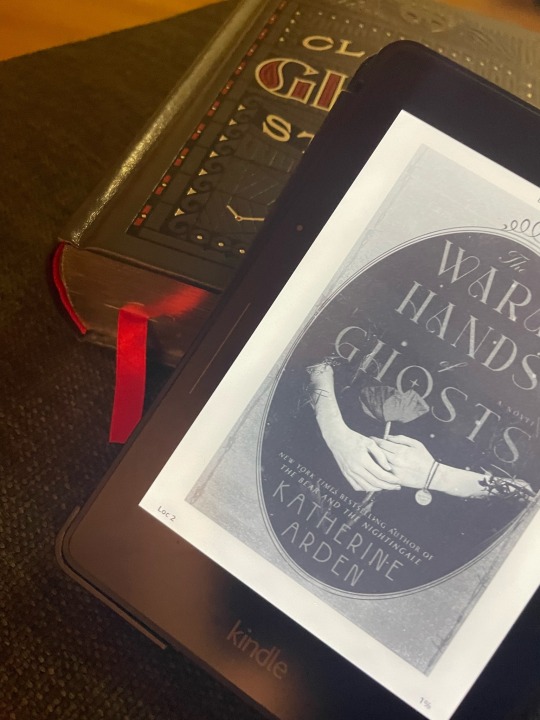
⭐️⭐️⭐️⭐️⭐️ The Warm Hands of Ghosts is an early contender for my favorite book of the year. It’s a tour de force. There’s a lot of plates spinning in this historical-gothic-ghost-horror-fantasy, and Arden manages them with the grace of a seasoned professional. The book has two parallel but offset timelines: the first beginning in January 1918, covers Laura, a heroic combat nurse who has come home from the front after suffering an injury. She receives her brother Freddie’s things, a typical indication that he is dead, but the letters from her nurse colleagues indicate that something else may be going on. Meanwhile, in November of 1917, Freddie wakes up alone in a dark pillbox with a German soldier. They band together to get out, and they form a bond. As they desperately try to get out of no man's land they meet a mysterious violinist who may be more than he seems. As Laura fights to find the truth about her brother, and Freddie fights to stay alive, the book charts their course across Belgium.
This is not the kind of book I usually like. It moves at the slow pace of history. It’s mostly about people’s feelings, and their relationship. It (and this is historically accurate, so it’s not a complaint) is far, far, bleaker than I usually like my fiction. This book is unflinching. It is not for the faint of heart. It is full of mud and guts and body parts and death. So when I say that I loved this book, that means something. It is clear that Arden spent a long time thinking about this book and it shows. It is very finely crafted. The two timelines interleave in a way that does not feel jarring or irritating. There are some very, very, fine sentences. And the book is thinking deep thoughts about big themes, like “is the appropriate reaction to the end of the world despair or courage?” But it never becomes moralistic or overwrought. It’s going to keep me thinking about those big themes for a while now too.
I recommend this book to people who like gothic tragedies, have strong stomachs, and are ready to sit with some philosophical questions for a while.
I received an advance copy of this book in exchange for this honest review.
#bookstagram#bookreview#bookrecommendations#books#justfinishedreading#historical#gothic#ghost#historical fiction#historical fantasy
0 notes
Text

⭐️⭐️⭐️⭐️ The Butcher of the Forest is Nettle and Bone’s darker, edgier younger sibling. It has the same fresh take on an old story, but this one will not make you feel warm and fuzzy inside. It’s dark, it’s gritty, it’s seen some stuff. It’s definitely not for children. It is fantasy edging into horror. Who’s to say that’s not right, in the end--if magic were real, it would probably be horrifying. The magic, as Mohamed describes it, is a dangerous, visceral, chaotic sort of thing. One that is best kept away from you because it’s more likely to take something away from you than it is to lend you a hand.
This novella is very tight--at 160 pages it does not waste any time. The plot feels like a well trod path for the first few pages: two children lost in a forest, an evil king sends a plucky everywoman to rescue them. But it quickly transforms into more than a standard retelling. I enjoyed the author’s previous novella “And What Can We Offer You Tonight,” but this is, to my mind, a major step up in quality. The sentences are better--the pacing is clear, and the world building feels more substantial. And the ending is to me a satisfying and true feeling conclusion. Many authors confuse ambiguous plots for moral ambiguity--this book has the latter but not the former. I think it would make an excellent book club pick.
Recommended for people who like ALL of T. Kingfisher’s books, Ninth House, and the O.G. Grimms Brothers.
I was provided with an advance copy in exchange for this honest review.
#bookstagram#bookreview#bookrecommendations#books#justfinishedreading#horror#dark fantasy#fairytale#novella
0 notes
Text

⭐️⭐️⭐️⭐️ The Will of the Many is big dumb epic fantasy at nearly it’s best. It’s an immersive world with tons of characters and lots of cultures to explore and an in-depth magic system that is interesting and feels reasonably fresh.
It sticks to tried and true tropes (the long lost prince, the political intrigue, the sinister empire) but it executes well enough to entertain and the the plot clips along nicely for the most part. (At 600+ pages it could do with a little trimming, but less than you’d think for a book of its size.)
Despite gesturing at big moral themes, this book is primarily here to entertain you, and it does a great job at that. I had a lot of fun reading it, and was definitely quite surprised by some of the twists—especially at the end. Readers should be warned that there’s a cliffhanger and the second one isn’t out yet.
I particularly recommend it to people who liked The Hunger Games in middle school, but want something a little more adult now, and fans of the Red Rising books.
1 note
·
View note
Text
LITERARY SENIOR SUPERLATIVES 2023
It’s that time of year, when we look back at what we’ve read and enjoyed (and not enjoyed) this year. I had some very good, some very bad, and very weird reads this year. Here are some of the most memorable page turners on my shelves in 2023. Feel free to take and modify as you need.
First book: The Sittaford Mystery
Most recommendable: The Underworld
Biggest Disappointment: The Jewels of Paradise
Best Dressed: The Pomegranate Gate
Best Sequel: He Who Drowned the World
Worst Sex Scene: Accelerando
Class Clown: Operation Mincemeat
Most Likely to Reread: System Collapse
Most Athletic: The Water Outlaws
Biggest Surprise: Foundryside
Most Likely to be President: Field of Blood
Best Debut: Queen of the High Fields
Most Likely to be a Movie Star: Witch King
Cutest Couple: Starling House
Saddest I didn’t Get to: The Will of the Many
Most Anticipated 2024: Those Beyond the Wall
0 notes
Text
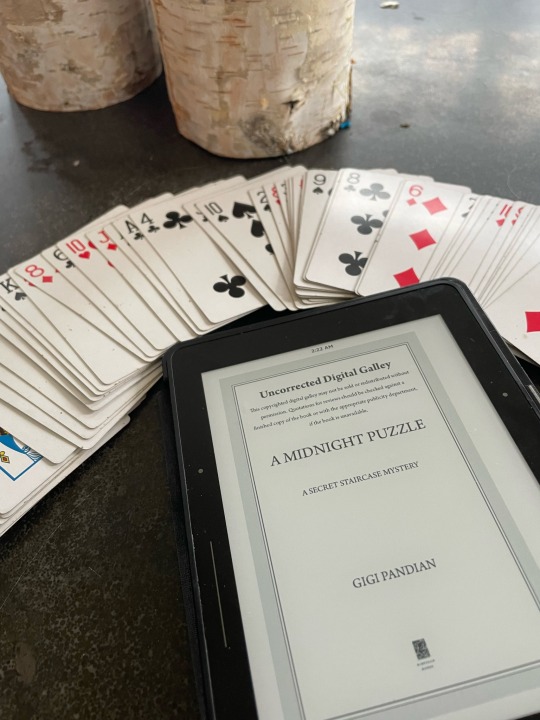
⭐️⭐️⭐️⭐️ Once again I find myself in the position of reviewing the third book in a series. I have very much enjoyed the first two books in this series (Under Lock and Skeleton Key, and The Raven Thief), and was eagerly awaiting the third, so I was thrilled when I was given the opportunity to review this ARC. Readers who have read and enjoyed the prior entries in this series will find a lot to like about this new work--the same found family cozy vibes, the luscious descriptions of food, and the seemingly impossible mysteries are all still present, as are the characters we’ve come to know and love.
I confess myself to have been less interested in the overarching mystery that has been driving Tempest through the series--and more interested in the mystery of the week flavor. In this book the overarching mystery comes to take center stage, which somewhat (but not a lot) influenced my enjoyment of the book. I also felt that there was something of a drop off in the tightness and creativity of the “impossible” mysteries in this book (though that might be because The Raven Thief set such a high bar in that regard). I’m also less interested in the budding love triangle, which is playing a more prominent role in this book.
Finally, I did predict the culprit a pretty long way out, whereas some of the other books in the series kept me guessing all the way until the end. So overall I’d say that this is a slightly disappointing, but overall still quite enjoyable entry in the series. However, as a warning, if you aren’t already reading this series--begin at the beginning--this is not a series that you can dip into and out of with no regard for order. If you enjoy locked room mysteries, found families, and mysteries that are more concerned with entertaining you than “realism,” this would be a good series to try--just start at Under Lock and Skeleton Key.
What I am most grateful to this book and series for is introducing me to John Dickson Carr--one of my favorite mystery authors, and also bringing its usual brand of charm and whimsy to my life.
I received an ARC from the publisher in exchange for this honest review.
0 notes
Text
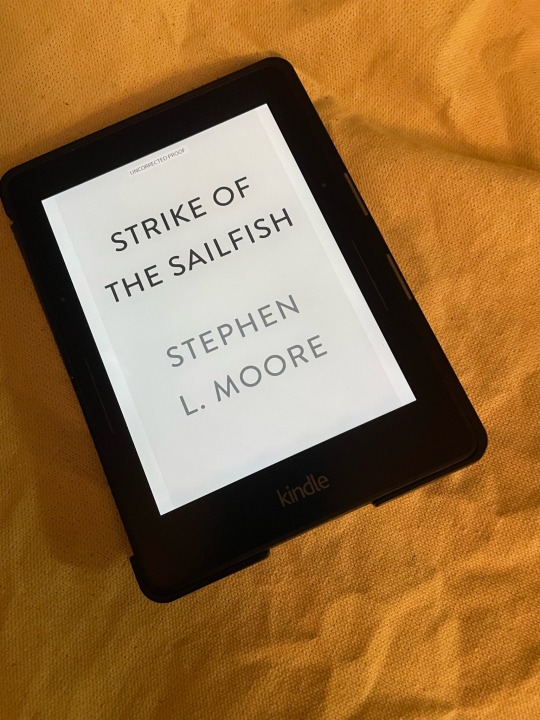
I’m not the ideal reviewer for Strike of the Sailfish. I have what I think can charitably be called a decent working knowledge of the Pacific theater in World War 2, but I didn’t study it at the collegiate level, and I tend to read more speculative fiction than historical fiction. This book assumes you’ve read at least three and maybe five to ten books about World War 2, and at least one other in depth look at the Pacific theater.
It’s got a laserlike focus on two subs during the back half of the war, and it leaves it up to you to contextualize the stories. It was still an enjoyable read for me, but I felt like I would have been able to get a lot more out of it if I wasn’t doing quite so much googling or just rolling with the punches.
It’s a well documented story, and the author has the advantage of excellent source material. And while he does a good job, it’s merely a good job, and not a great one. He tells the story of two sister submarines, both commissioned at around the same time. One of them had a tragic accident while out on an early training run, and the sister sub came to her rescue. On the battlefield they met again, with roles somewhat reversed. It’s a good story, and not one I knew about. I enjoyed getting a sense of what life was like on a submarine. However,I think a casual reader would get more out of a broader scoped look at the history, but if you’re a buff, this might be a story you hadn’t heard yet.
I received an advance review copy from the publisher in exchange for this honest review.
1 note
·
View note
Text
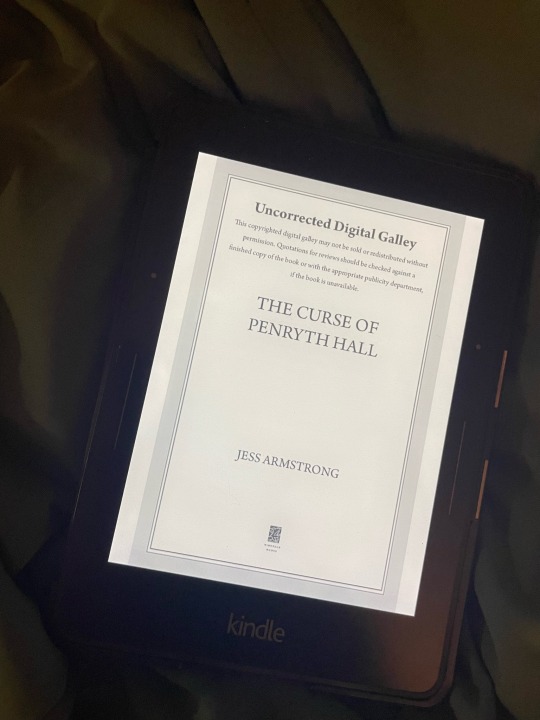
⭐️⭐️ The experience of reading Curse of Penryth Hall is like drinking a wine that hasn’t fully completed the aging process. The core concept is good, and the mystery is solid. The characters are passable, but occasionally have to hold the idiot ball or become two dimensional in service of the plot. I have a lot of issues with the sentence craft of this book, and unfortunately, the good idea, solid mystery, and middling characters mean I can’t in good fait recommend this book.
I’ve had experiences like this before, and in my opinion the person first in line for the blame is the editor. The author has promise, but the correct response here is: “Congratulations on finishing your novel. It’s not ready for prime time, but I’d be interested in seeing your next one.” The sentences are just too rough. In places I found myself skimming because the poorly constructed sentences were repelling my eyes as oil does to water.
The core idea of a haunted Welsh mansion where people start dying is a good one, but that is an idea that rests on vibes. I want to feel the wind off the moor on my neck, and smell the mist in the morning. Instead it felt like listening to a teenage girl tell you about her day at school. I also took issue with some inconsistent and unconvincing character choices. The main character Ruby, lives with a bookseller, who’s only personality traits are old and fatherly. It’s entirely unclear why he likes Ruby, who appears to be a selfish drunk (I do not understand why everyone thought she was charming. She reminded me most of a Frat bro.) I recommend giving this one a pass.
I received an advance copy in exchange for this honest review.
0 notes
Text
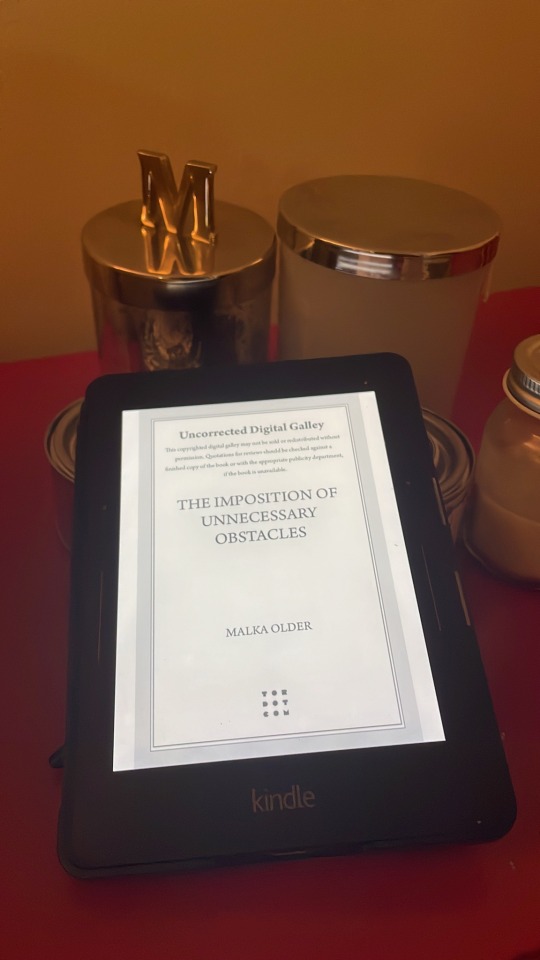
Mossa and Plieti are back, in another gaslamp mystery set on floating platforms in the upper atmosphere of Jupiter. Students are going missing from the university, and Mossa once again must turn to Plieti to help crack the case. As they navigate their slowly blossoming relationship, they find that there might be more to this missing persons case than just one student.
You all know that I loved the first of these a lot, and while there’s still plenty to enjoy in the follow up, for me it didn’t quite capture the same magic as the first one. I thought the first had an exciting, original, and imaginative world and a mystery that managed to surprise me. The second is similar, but the shine is just a little duller. The mystery felt like it was rehashing old ground, and the solution didn’t feel as tight or as clever. The sense of wonder and exploration was missing as well, because I knew the world. I think, as a mystery genre reader, this was the thing that rang the most hollowly to me--the mystery felt like an afterthought. It wasn’t clever, or puzzling, and the clues didn’t seem to be driving the plot. Similarly, the arc of the romantic relationship seemed meandering and somewhat purposeless.
One other false note for me was that the book ultimately seemed to undermine some of the warm, cozy, and wholesome vibes that the first had carefully constructed. It may be realistic to note that all societies have power differentials and some people in positions of power will abuse their positions, one of the things I liked about the first was that in this society that seemed to be generally good. Here we are finding more and more instances of it and it didn’t seem to mesh with the cozy vibes.
I will probably continue reading this series, but perhaps with more realistic expectations.
I received an advance copy from the publisher in exchange for this honest review.
0 notes
Text

I got told by enough people that judging Charles Stross by the first book that he ever published was not fair, so here I am trying a different one. It won the locus award and was nominated for several other awards, so I think by any stretch I’ve now given Mr.Stross a fair shake. My feelings are largely unchanged. It’s sexist, mistakes technical jargon for world building, and calling the character development two dimensional is fundamentally unfair to the concept of planes.
This book calls itself a novel but is actually connected short stories, which is strike one because I felt bait and switched. I also don’t know what issues/fetishes/etc Mr. Stross has with women in power and/or his mother, but I would humbly suggest that he work them out somewhere more private than this novel.
I’m giving it two stars because there’s two passages that are actually clever and funny which honestly makes me more angry because there was the kernel of a few good ideas in here. Unfortunately Mr. Stross thinks he’s cleverer than he is and can’t get out of his own way to let this work breathe.
It also wins the war for most upsetting sex scene I’ve read this year and possibly this decade (and that tells me no women looked at this book before it became public). In short Mr. Stross is not for me, and since he probably doesn’t think I’m a real person (the last chapter has a woman being offered to the male protagonist as payment), it’s not really a mystery why.
0 notes
Text
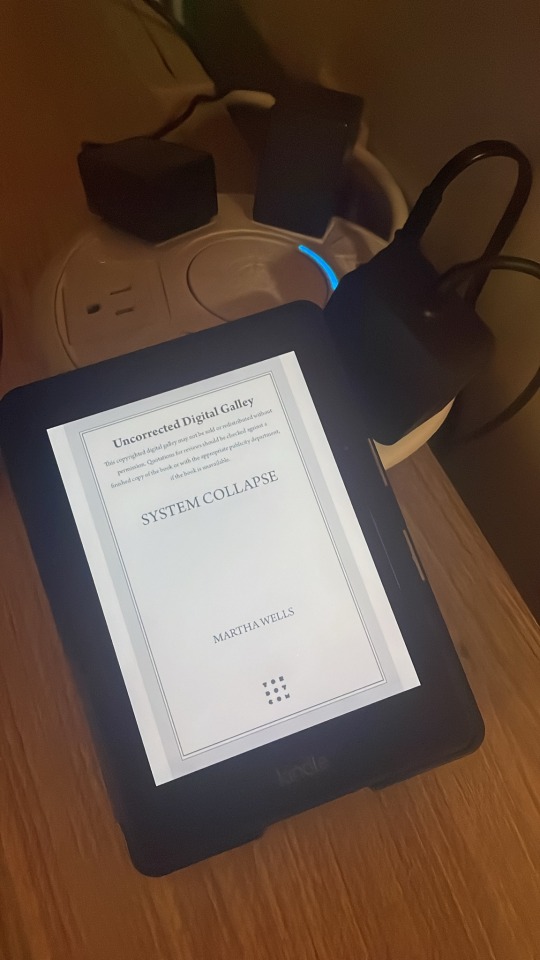
I really don’t know why I’m here. At this point, more than five books into the Murderbot series, you’ve made a choice about whether you’re in or out. I love Murderbot with all my heart and soul, and if you’re a Murderbot stan, I promise that this new entry into the extended Murderbot universe will not disappoint you. And actually if you were more lukewarm on the latest Murderbot, this new novel (yes, novel, not novella--and there was much rejoicing) is a pretty direct sequel to Network Effect. It’s full of Murderbot doing Murderbot things--fun action, corporate skullduggery, and Murderbot feeling uncomfortable about emotions.
If somehow you’ve been living under a rock, and you aren’t familiar with our lord and savior Murderbot, let me give you a quick pitch for why you should be interested in this series. (But if you are, start at the beginning with All Systems Red, not here--this one will make no sense.)
Murderbot is a SecUnit (Half-human half-robot designed to provide security), living in a corporate dystopia. Murderbot has hacked its own governing module, and would like to be left alone to watch it’s trashy TV shows, but unfortunately self awareness also means Murderbot has emotions, and those are inconvenient. If you want to read about a cynical sassy android that is maybe the world’s most relatable robot--get you to Murderbot and you can thank me later.
I received a free Advance Reader Copy in exchange for this honest review.
39 notes
·
View notes
Text
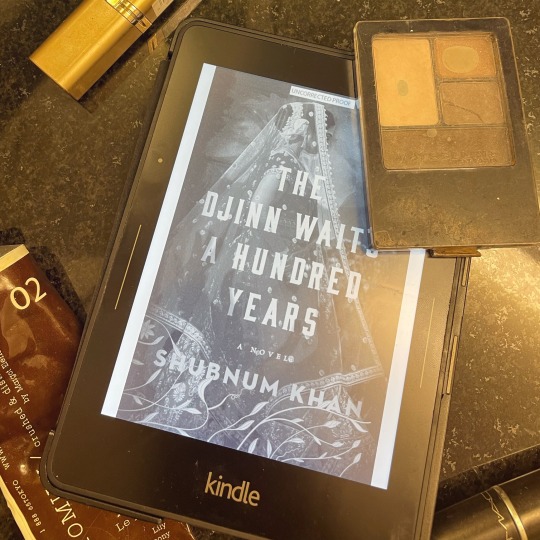
The main problem I had with The Djinn Waits 100 Years was one of expectations. The comps were Psycho and Rebecca, so I opened this book expecting a tight, gripping, domestic thriller, with an edge of the supernatural. Unfortunately, that was not what I got. In fact, if the comps had been more accurate, and the marketing had been better aligned with what was actually in the pages, I probably would not have picked up this book. But that’s not the fault of the book, or even the author. So I’m going to do my best to review this book fairly, despite having had a very disappointing reading experience. (I don't have anything against literary fiction. There are many people who love it, and they deserve to have many wonderful books to read. I just prefer not to read it in the same way that some people don’t want to read murder mystery novels.)
At its core, the Djinn Waits 100 Years is a work of literary fiction. It is not interested in the djinn that haunts the house, or the domestic thriller that is a small part of the plot. This book is interested in relationships and trauma, and healing, and studies of character. If you go in expecting, or even looking forward to, a more languid book that is a study of a group of Indian expats living in South Africa, based around a teenage girl and her father grieving the death of her mother, I bet you’d have a much different and better experience than I did reading this book. The sentences are lovely, and the characters are interesting and well drawn. But I kept waiting for the domestic thriller, and the Djinn to start haunting.
My best advice for people trying to decide if they want to read this book is to pay no attention to the marketing or the comps. This is a book of literary fiction about a sad old group of people looking back on the choices they made in their lives and the people they have loved and lost. If that sounds like something you’re interested in--give this a shot. If not, you’re better off looking elsewhere for your next read. And my advice for the people developing marketing plans and comps for books--be as true and accurate to what is in the book as possible--you don’t get good word of mouth if readers feel like they’ve been tricked into reading a book they would otherwise have skipped.
I received an advance reader copy in exchange for this honest review.
0 notes